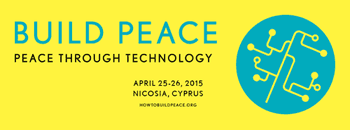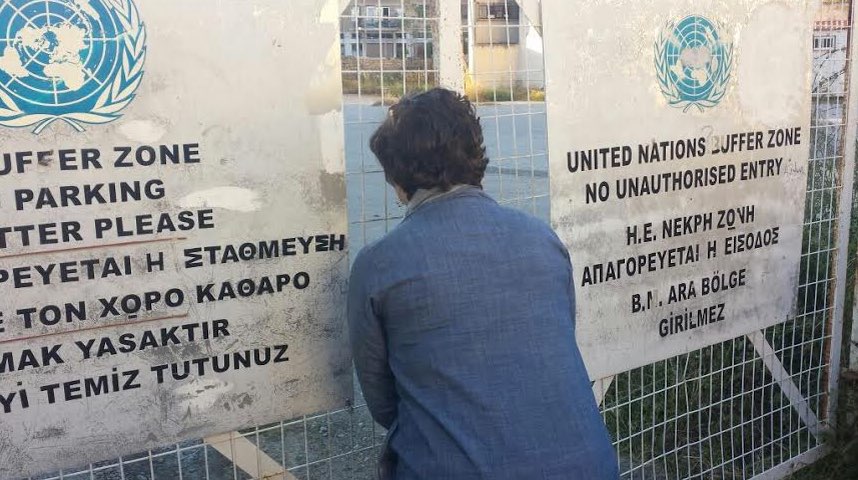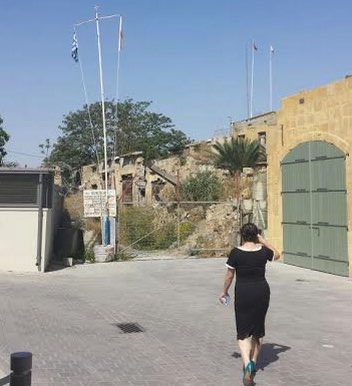Future Now
The IFTF Blog
Futures at Build Peace 2015
 This past April I flew to Cyprus, a small island nation about 100 miles off the coast if Syria, to participate in the second annual Build Peace Conference. The small island nation is home to one of the world’s longest running conflicts. Although the conflict is no longer violent, the island is divided with a UN Buffer Zone literally splitting the capital and the rest of the island in two with the Turkish north and the Greek south separated, peacefully. Although relations between the two sides are warming up, these two halves of a nation are isolated with no formal trade or collaboration.
This past April I flew to Cyprus, a small island nation about 100 miles off the coast if Syria, to participate in the second annual Build Peace Conference. The small island nation is home to one of the world’s longest running conflicts. Although the conflict is no longer violent, the island is divided with a UN Buffer Zone literally splitting the capital and the rest of the island in two with the Turkish north and the Greek south separated, peacefully. Although relations between the two sides are warming up, these two halves of a nation are isolated with no formal trade or collaboration.
The Buffer Zone is a fascinating site of buildings frozen in time in since 1974.
 During the second day of the conference I hosted a two-hour workshop on futures thinking and peacebuilding. I opened the session by asking participants to place themselves in quadrants in the room related to whether they think the world is getting better or worse, and if they think they are able to affect the future or not.
During the second day of the conference I hosted a two-hour workshop on futures thinking and peacebuilding. I opened the session by asking participants to place themselves in quadrants in the room related to whether they think the world is getting better or worse, and if they think they are able to affect the future or not.
I did this in part because the future, and in particular our orientation to the future, has big implications for the things we do today. Asking these questions helps reveal individual and group assumptions about the process of change, and the kinds of solutions or processes that will be most effective.
 The group of about 30 peacebuilders from around the world was pretty evenly split between whether we are on a positive or negative trajectory of change. Climate change was a big concern, noting that as we face increasing environmental challenges we’ll struggle with increased economic insecurity, competition over resources, and public health disasters. Others noted we’re in a positive trajectory; conflicts and violence have declined globally, and living standards and lifespans are generally on the rise.
The group of about 30 peacebuilders from around the world was pretty evenly split between whether we are on a positive or negative trajectory of change. Climate change was a big concern, noting that as we face increasing environmental challenges we’ll struggle with increased economic insecurity, competition over resources, and public health disasters. Others noted we’re in a positive trajectory; conflicts and violence have declined globally, and living standards and lifespans are generally on the rise.
The question of whether or not we are able to influence the future had interesting results. Everyone moved to the same side of the room. It was unanimous; everyone in the room could influence the future. This is an awesome testament to the nature of peacebuilders. Despite everything they may be dealing with there is a general sense of hope and optimism. Peacebuilders become peacebuilders because they believe there is a possibility to move from conflict to peace. Unfortunately, when we dug deeper and talked about how people are able to influence the future, we were stuck at peer-to-peer, or conflict specific influence. As peacebuilders they are able to work with one person to overcome trauma, to change their engagement within a conflict, to possibly stop someone from becoming armed and perpetuating violence. But there was a clear sense that changing the future on a systemic level was out of reach.
This is an important truth: peacebuilding struggles to address the macro structures that perpetuate the drivers of conflict. We need to evolve beyond resolving specific conflicts towards building the foundations of a world that doesn’t drive people towards conflict.
Building a Vision for a Post-Conflict World
To help build a vision for a post-conflict world, we’ve begun mapping emerging alternative structures of equality and inclusion. We’re tracking four foundational transformations that will challenge traditional power structures and support just, equitable, and productive futures for all.
Futures thinking can help to level-up peacebuilding to systems level change by shining a light on how these transformations are changing global structures and opening up opportunities to build equity, opportunity, and dignity for all.
NEW DESIGN
Infrastructures that are designed specifically to support peace through inclusion, diversity, and open access are becoming more sophisticated. A failure to design our spaces in promotion of peace have led to dramatic negative effects; cities and criminal justice systems around the world, for example, are rethinking how they design their spaces in the service of peace.
NEW INFORMATION FLOWS: OPEN + MULTIDIRECTIONAL
In Africa alone, 1 billion people have access to new information and communication channels for the first time ever. Throughout colonization education was highly regulated as a method of control, leaving nations almost empty of university-educated citizens. Many countries are now graduating their first generations of highly educated youth. At the same time, access to the internet is further breaking down barriers to accessing and sharing information. This transition will create new experts, new narratives, and new forms of accountability.
NEW WAYS TO ORGANIZE
Throughout human history we have slowly been leveling up our scale of organizing: from the family and the clan, to the farming community and the city, to the nationstate. Today we have the tools—from SMS to chat apps and social media—to organize both at the global scale and peer-to-peer. As internet penetration reaches 100% access globally, this will have profound effects on how we organize our societies and make collective decisions.
NEW ECONOMICS
Pope Francis recently came out strongly against capitalism and mass consumerism. There’s growing awareness that our dominant economic model may lead to our demise as the constant search for profit and economic growth is leading to unsustainable levels intrastate inequality and environmental degradation. While alternative models of exchange are slowly emerging, we need to systematically understand which are effectively scalable to create a viably competitive model of value and exchange.
For more information about this work, connect with Tessa at tfinlev@iftf.org



